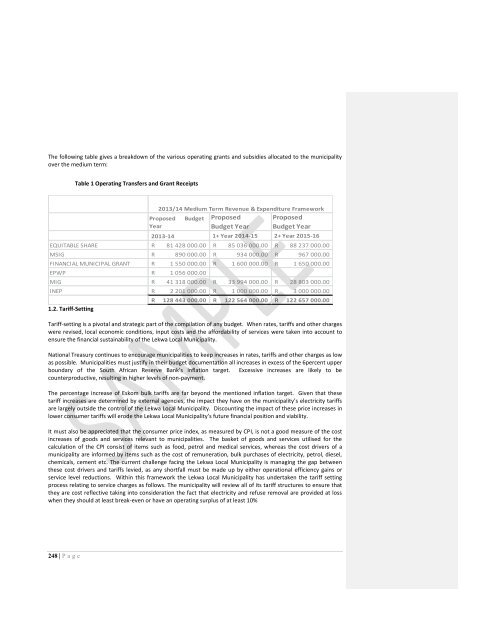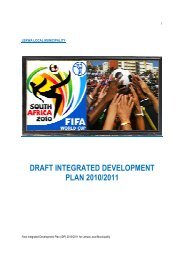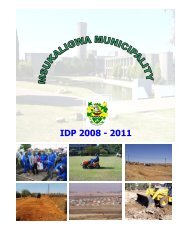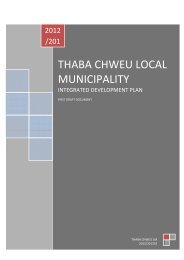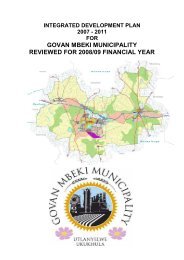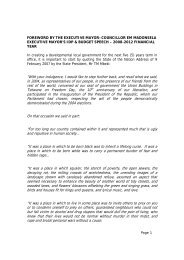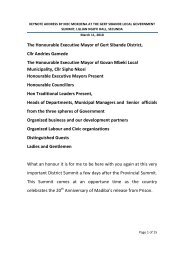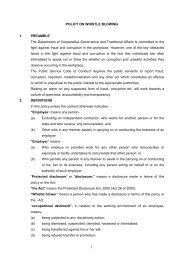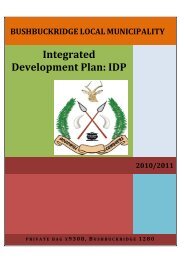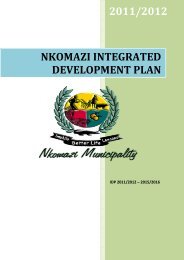Lekwa Local Municipality 2013/14 - Co-operative Governance and ...
Lekwa Local Municipality 2013/14 - Co-operative Governance and ...
Lekwa Local Municipality 2013/14 - Co-operative Governance and ...
Create successful ePaper yourself
Turn your PDF publications into a flip-book with our unique Google optimized e-Paper software.
The following table gives a breakdown of the various operating grants <strong>and</strong> subsidies allocated to the municipalityover the medium term:Table 1 Operating Transfers <strong>and</strong> Grant Receipts<strong>2013</strong>/<strong>14</strong> Medium Term Revenue & Expenditure FrameworkProposed Budget Proposed ProposedYearBudget Year Budget Year<strong>2013</strong>-<strong>14</strong> 1+ Year 20<strong>14</strong>-15 2+ Year 2015-16EQUITABLE SHARE R 81 428 000.00 R 85 036 000.00 R 88 237 000.00MSIG R 890 000.00 R 934 000.00 R 967 000.00FINANCIAL MUNICIPAL GRANT R 1 550 000.00 R 1 600 000.00 R 1 650 000.00EPWP R 1 056 000.00MIG R 41 318 000.00 R 33 994 000.00 R 28 803 000.00INEP R 2 201 000.00 R 1 000 000.00 R 3 000 000.001.2. Tariff-SettingR 128 443 000.00 R 122 564 000.00 R 122 657 000.00Tariff-setting is a pivotal <strong>and</strong> strategic part of the compilation of any budget. When rates, tariffs <strong>and</strong> other chargeswere revised, local economic conditions, input costs <strong>and</strong> the affordability of services were taken into account toensure the financial sustainability of the <strong>Lekwa</strong> <strong>Local</strong> <strong>Municipality</strong>.National Treasury continues to encourage municipalities to keep increases in rates, tariffs <strong>and</strong> other charges as lowas possible. Municipalities must justify in their budget documentation all increases in excess of the 6percent upperboundary of the South African Reserve Bank’s inflation target. Excessive increases are likely to becounterproductive, resulting in higher levels of non-payment.The percentage increase of Eskom bulk tariffs are far beyond the mentioned inflation target. Given that thesetariff increases are determined by external agencies, the impact they have on the municipality’s electricity tariffsare largely outside the control of the <strong>Lekwa</strong> <strong>Local</strong> <strong>Municipality</strong>. Discounting the impact of these price increases inlower consumer tariffs will erode the <strong>Lekwa</strong> <strong>Local</strong> <strong>Municipality</strong>’s future financial position <strong>and</strong> viability.It must also be appreciated that the consumer price index, as measured by CPI, is not a good measure of the costincreases of goods <strong>and</strong> services relevant to municipalities. The basket of goods <strong>and</strong> services utilised for thecalculation of the CPI consist of items such as food, petrol <strong>and</strong> medical services, whereas the cost drivers of amunicipality are informed by items such as the cost of remuneration, bulk purchases of electricity, petrol, diesel,chemicals, cement etc. The current challenge facing the <strong>Lekwa</strong> <strong>Local</strong> <strong>Municipality</strong> is managing the gap betweenthese cost drivers <strong>and</strong> tariffs levied, as any shortfall must be made up by either operational efficiency gains orservice level reductions. Within this framework the <strong>Lekwa</strong> <strong>Local</strong> <strong>Municipality</strong> has undertaken the tariff settingprocess relating to service charges as follows. The municipality will review all of its tariff structures to ensure thatthey are cost reflective taking into consideration the fact that electricity <strong>and</strong> refuse removal are provided at losswhen they should at least break-even or have an operating surplus of at least 10%248 | P a g e


